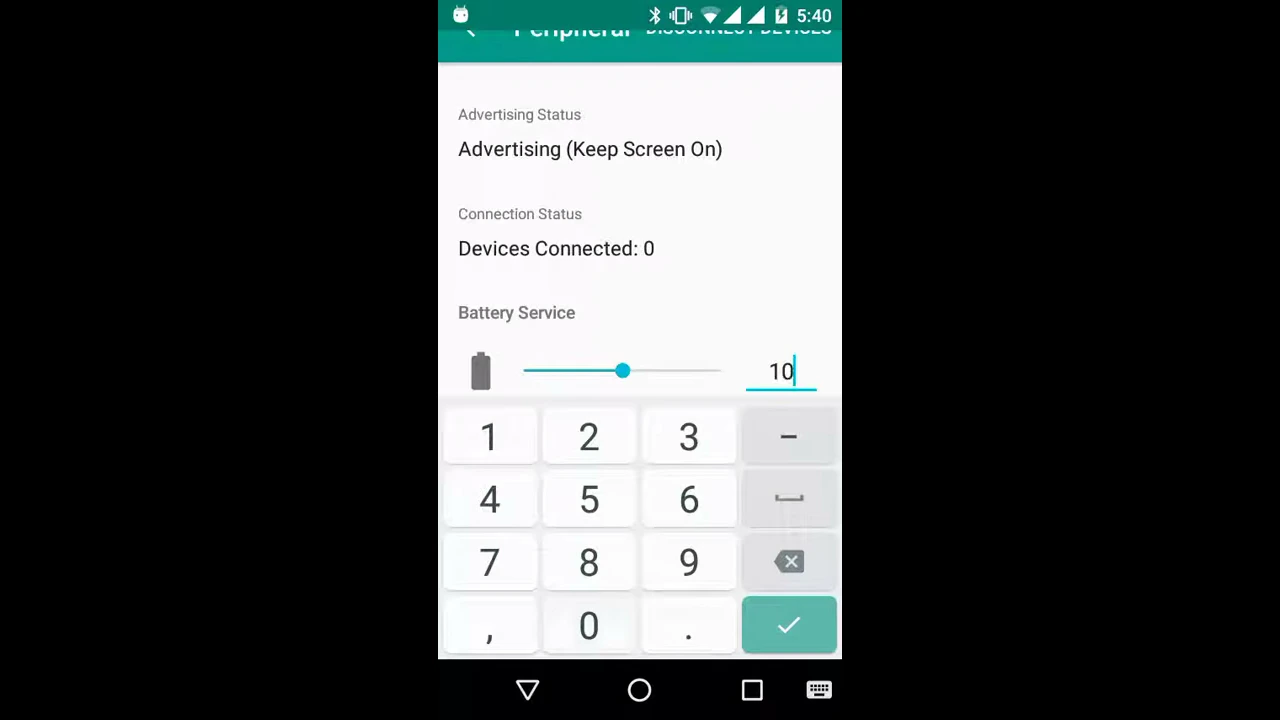BLE Swift write characterisitc
The Swift code written by you is not equivalent to the Objective-C example. The data parameter should be initialized with binary "1" instead of a string "01:00":
var parameter = NSInteger(1)
let data = NSData(bytes: ¶meter, length: 1)
peripheral.writeValue(data, for: characteristic, type: .withResponse)
I think that whenever TI docs specify a value in quotes like "01:00" they really mean a hexadecimal value like 0x0100, which is a bit confusing.
Related videos on Youtube
gimba
Updated on June 04, 2022Comments
-
gimba almost 2 years
I am trying hard to get my TI sensortag temperature sensor to notify. According to http://processors.wiki.ti.com/images/a/a8/BLE_SensorTag_GATT_Server.pdf I need to set the value of the characteristic with UUID F000AA02-0451-4000-B000-000000000000 to "01:00". Here is what I do:
import UIKit import CoreBluetooth class ViewController: UIViewController, CBCentralManagerDelegate, CBPeripheralDelegate{ var centralManager:CBCentralManager! var blueToothReady = false var connectingPeripheral: CBPeripheral! @IBOutlet weak var textField: UITextView! override func didReceiveMemoryWarning() { super.didReceiveMemoryWarning() } override func viewDidLoad() { super.viewDidLoad() startUpCentralManager() } func startUpCentralManager() { centralManager = CBCentralManager(delegate: self, queue: nil) } func discoverDevices() { centralManager.scanForPeripheralsWithServices(nil, options: nil) } func centralManager(central: CBCentralManager!, didDiscoverPeripheral peripheral: CBPeripheral!, advertisementData: (NSDictionary), RSSI: NSNumber!) { output("Discovered", data: peripheral.name) self.connectingPeripheral = peripheral centralManager.stopScan() self.centralManager.connectPeripheral(peripheral, options: nil) } func centralManagerDidUpdateState(central: CBCentralManager!) { //BLE status var msg = "" switch (central.state) { case .PoweredOff: msg = "CoreBluetooth BLE hardware is powered off" println("\(msg)") case .PoweredOn: msg = "CoreBluetooth BLE hardware is powered on and ready" blueToothReady = true; case .Resetting: var msg = "CoreBluetooth BLE hardware is resetting" case .Unauthorized: var msg = "CoreBluetooth BLE state is unauthorized" case .Unknown: var msg = "CoreBluetooth BLE state is unknown" case .Unsupported: var msg = "CoreBluetooth BLE hardware is unsupported on this platform" } output("State", data: msg) if blueToothReady { discoverDevices() } } func centralManager(central: CBCentralManager!,didConnectPeripheral peripheral: CBPeripheral!) { peripheral.delegate = self peripheral.discoverServices([CBUUID.UUIDWithString("F000AA00-0451-4000-B000-000000000000")]) output("Connected", data: peripheral.name) } func peripheral(peripheral: CBPeripheral!, didDiscoverServices error: NSError!) { if let servicePeripherals = peripheral.services as? [CBService] { for servicePeripheral in servicePeripherals { output("Service", data: servicePeripheral.UUID) peripheral.discoverCharacteristics(nil, forService: servicePeripheral) } } } @IBAction func refreshBLE(sender: UIButton) { centralManager.scanForPeripheralsWithServices(nil, options: nil) } func peripheral(peripheral: CBPeripheral!, didDiscoverCharacteristicsForService service: CBService!, error: NSError!) { if let charactericsArr = service.characteristics as? [CBCharacteristic] { for charactericsx in charactericsArr { peripheral.setNotifyValue(true, forCharacteristic: charactericsx) // ************************* if charactericsx.UUID.UUIDString == "F000AA02-0451-4000-B000-000000000000"{ output("Characteristic", data: charactericsx) let data: NSData = "01:00".dataUsingEncoding(NSUTF8StringEncoding)! peripheral.writeValue(data, forCharacteristic: charactericsx, type: CBCharacteristicWriteType.WithResponse) output("Characteristic", data: charactericsx) } // ************************* peripheral.readValueForCharacteristic(charactericsx) } } } func peripheral(peripheral: CBPeripheral!, didUpdateValueForCharacteristic characteristic: CBCharacteristic!, error: NSError!) { if var data :NSData = characteristic.value { output("Data", data: characteristic.value) } } func output(description: String, data: AnyObject){ println("\(description): \(data)") textField.text = textField.text + "\(description): \(data)\n" } }Problem is that peripheral.writeValue... doesn't seem to change anything. I looked at the objective c example found here http://www.ti.com/tool/sensortag-sw and think the corresponding lines to
let data: NSData = "01:00".dataUsingEncoding(NSUTF8StringEncoding)! peripheral.writeValue(data, forCharacteristic: characteric, type: CBCharacteristicWriteType.WithResponse)are these:
uint8_t data = 0x01; [BLEUtility writeCharacteristic:self.d.p sCBUUID:sUUID cCBUUID:cUUID data:[NSData dataWithBytes:&data length:1]];What am I missing?
-
gimba over 9 yearsIT S ALIVE! =D thank you very much, this really gave me a headache
-
Nikhil Gupta over 8 years@Michal Ciuba Instead of 1 if I want to write "0802". Can I simply do
var parameter = NSInteger(0802)? -
Webber Lai almost 8 years@NikhilGupta Try this : var parameter = 0x0802 let data = NSData(bytes: ¶meter, length: 2)
-
atlantach_james over 6 years@Michal Ciuba. Do you know if this method works with the new CC2650 SensorTag now that the gyro/acc/mag are organised under one MovementData UUID? If it says that the notify value needs to be set to 0x0001 to enable notifications for these sensors do I simply replace the following code from your example? Obv I know it cant be an integer but appreciate your feedback on this one as its not working for me. var parameter = NSInteger(0x0001)
-
 Michał Ciuba over 6 yearsUnfortunately I know nothing about CC2650 SensorTag. The only thing that comes to my mind is "endianness": maybe you can change the order of bytes? I mean, write:
Michał Ciuba over 6 yearsUnfortunately I know nothing about CC2650 SensorTag. The only thing that comes to my mind is "endianness": maybe you can change the order of bytes? I mean, write:var parameter = NSInteger(0x0100). Other than that, I'm afraid I can't help you. -
atlantach_james over 6 yearsThanks Michal. No luck with that unfortunately. Have tried lots of different iterations of this but no matter what I can't get this characteristic to notify.






